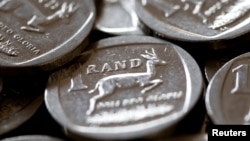South Africa's rand plunged more than 10 percent to a 2-year low against the dollar early on Monday and government bonds weakened sharply as a renewed rout in the Turkish lira spread to other emerging markets.
The rand, which later recovered to trade down 1.6 percent against the U.S. unit by 1500 GMT, is one of the most deeply traded emerging market currencies, making it susceptible to swings in sentiment on global markets.
The magnitude of the rand's slide came after three days of heavy losses and caught the South African Reserve Bank by surprise, but a deputy governor at the bank told Reuters that the regulator was "nowhere near" intervening to support the currency.
Highlighting South Africa's narrower current account deficit and smaller stock of short-term external debt than Turkey, analysts said investors should not be overly concerned by recent rand weakness.
"The rand is currently telling us a lot more about general emerging market sentiment than it is about South Africa in particular," said John Ashbourne of Capital Economics.
"The rand is likely to rebound in the short term as the situation in Turkey stabilizes," Ashbourne added.
The yield on South Africa's benchmark government bond maturing in 2026 rose 19.5 basis points to 9.050 percent, reflecting weaker bond prices.
The average yield premium to hold South African debt over safe haven U.S. Treasuries rose to 303 basis points (bps), having added more than 30 bps in the past week.
The lira has lost more than 40 percent of its value this year on worries over Turkish President Tayyip Erdogan's increasing control over the economy and deteriorating relations with the United States.
It did find a sliver of support on Monday, when Turkey's central bank said it would take all measures necessary to maintain financial stability.
"The Turkey crisis was caused by monetary policy reacting in a completely unsuitable manner. Countries with a decent monetary policy should be in a better position," Commerzbank analysts wrote in a research note, referring to South Africa.
"The recovery of the rand ... confirms that at least some market participants have trust in the (South African Reserve Bank) to react appropriately."
Johannesburg-listed stocks were mostly spared the pain felt elsewhere in South African assets.
The All-share index closed up 0.32 percent at 57,885 points, while the Top-40 index ended 0.47 percent higher at 51,821 points.
One outlier was South African pulp and paper maker Sappi, however. Its shares fell 9.5 percent after the company reported a 12 percent drop in quarterly profit.





